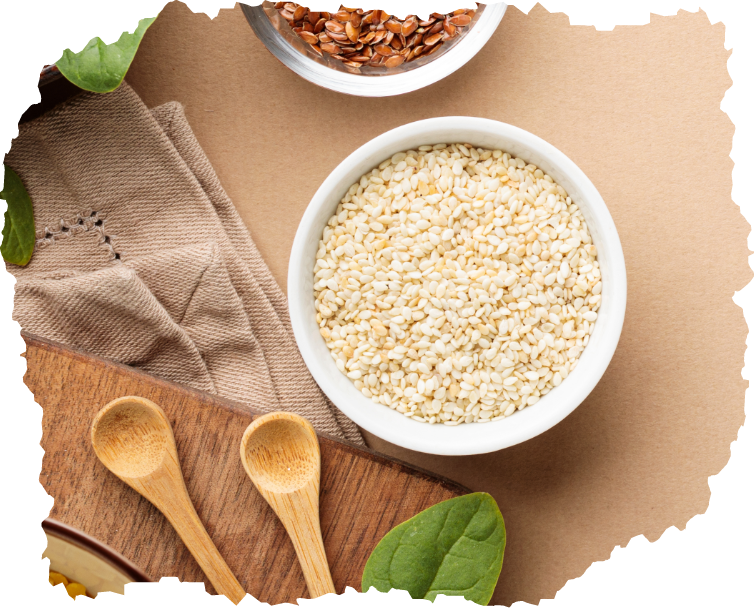Sesame is a plant that man has known for many centuries. The applications for sesame seeds and oil have changed throughout the years, but they are still used mainly in culinary applications. Sesame is characterised not only by its perfect taste – according to dietic data, sesame contains plenty of nutrients, which have a positive impact on our health. The most popular sesame varieties are white sesame, black sesame, and Indian sesame. Why is it worth to include sesame in our daily diet? What information are vital in the context of sesame consumption?
Sesame and sesame oil – a wealth of vitamins
Sesame is classified as a product that contains B group vitamins (B2, B3, and B12) that have a beneficial influence on nervous system function. The main tasks of these vitamins cover alleviating nervous tension. Additionally, they help upkeep a positive mood, good well-being, and intellectual efficiency.
An important ingredients of sesame seeds are also antioxidants and vitamin E1. Their main function is neutralising so-called free radicals, the excessive amount of which impacts skin condition and constitutes one of the main causes of discoloration, irritation, and wrinkles. Therefore, sesame oil and sesame are often used to manufacture face masks.
Sesame – characteristics beneficial for gastrointestinal tract
Because of fibre content2, sesame is a perfect support for gastrointestinal tract. Among main benefits resulting from appropriate fibre supply we should list i.e. controlling defecation, improving intestine peristalsis, reducing level of sugar in blood, slowing fat assimilation by body, or controlling large intestine function.
Phytosterols contained in sesame versus circulation
Among important nutrients included in sesame we can find phytosterols3, which have a positive influence on circulatory system function. First of all, they allow to regulate blood pressure among people struggling with hypertension and reduce the level of so-called bad cholesterol in blood4. Phytosterol characteristics also minimise the risk of atherosclerotic lesions occurrence.
Sesame oil and seeds contain phosphorus
Health properties of sesame should also be reviewed in the context of phosphorus contained in them. The valuable properties of this ingredient mainly concern our skeleton – over 80 percent of phosphorus in our bodies is located in bones. Therefore, appropriate phosphorus supply is necessary in order to keep their condition and proper strength.
On the other hand, phosphorus deficiency can lead to occurrence on many negative health consequences – among which we should list i.e. increased risk of occurrence and development of so-called osteomalacia (adult rickets), that is, a disease that softens bones. Additionally, phosphorus deficiency can cause muscle and joint pains, as well as reduce general immunity.
Sesame seeds – a rich source of calcium5
Sesame seeds also contain calcium, which is beneficial for skeletal system function. It allows to more effectively eliminate diseases such as: Rheumatoid Arthritis6 and osteoporosis. It also contributes to quicker recovery in case of sport injuries – especially fractures, joint dislocations, and joint sprains.
Sesame – source of beneficial zinc
Nutritional values of sesame seeds are also completed by zinc, which is responsible for many processes in our bodies. First of all, it has a positive influence on our immunity.
The role played by zin in the context of beauty, i.e. nails and hair, is also vital. People struggling with zinc deficiency are more susceptible to occurrence of acne lesions, psoriasis, dried skin, stretch marks, hair loss, and nail brittleness. In such cases skin shows a tendency for quicker aging.
Sesame seeds – high unsaturated fatty acids content7
The main ingredients of sesame oil and seeds are fats including unsaturated fatty acids (UFA), which our bodies need in order to properly function.
They are divided into two groups: polyunsaturated (i.e. Omega-6 and Omega-3) and monounsaturated (i.e. crotonic acid or olein acid) fatty acids. Unfortunately, human body can only produce acids from the second group while we must autonomously provide our bodies with polyunsaturated acids during meals.
UFA play many significant health functions, among which we can list i.e. minimising diabetes occurrence risk, positive influence on concentration, memory, focus and brain function, and improving quality of skin, nails and hair. Additionally, they support circulatory system function by controlling the blood pressure level.
How to introduce sesame to daily diet?
Sesame does not belong to ingredients very popular in European cuisine, but it seeds are increasingly more often used when preparing dishes, e.g. hulled sesame. If we do not want to introduce sesame to additive repertoire in our kitchen, there is a possibility to combine practicality with pleasure. This possibility has the form of sesame seed snacks – i.e. Amki Sesame Snaps or halva (made from sesame seeds ground into tahini). It is a perfect proposition for people, who do not like to cook or simply look for a way to supply sesame to their bodies in a simple and convenient way. Crispy Amki Sesame Snaps or halva will be a great snack for a meeting by a cup of coffee, as a lunch, or as regenerating snack after a training or during canoe rally or bicycle trek.
1 https://pacjent.gov.pl/aktualnosc/zimowy-alfabet-odpornosci
2 https://www.mp.pl/pacjent/dieta/lista/77037,ktore-produkty-zywnosciowe-zawieraja-blonnik
3 https://pulsmedycyny.pl/zywnosc-funkcjonalna-wzbogacona-o-sterole-i-stanole-roslinne-obniza-stezenie-cholesterolu-976062
4 https://www.mp.pl/pacjent/dieta/zasady/136300,9-zrodel-zdrowych-tluszczow-w-twojej-diecie,2
5 https://www.mp.pl/pacjent/pediatria/karmienie-piersia/91602,odzywianie-mamy-karmiacej
6 https://pacjent.gov.pl/aktualnosc/zadbaj-o-sprawne-stawy
7 https://www.mp.pl/pacjent/dieta/zasady/136300,9-zrodel-zdrowych-tluszczow-w-twojej-diecie,2





